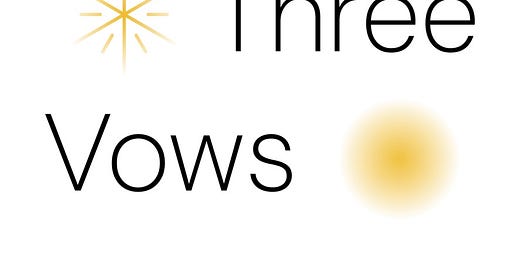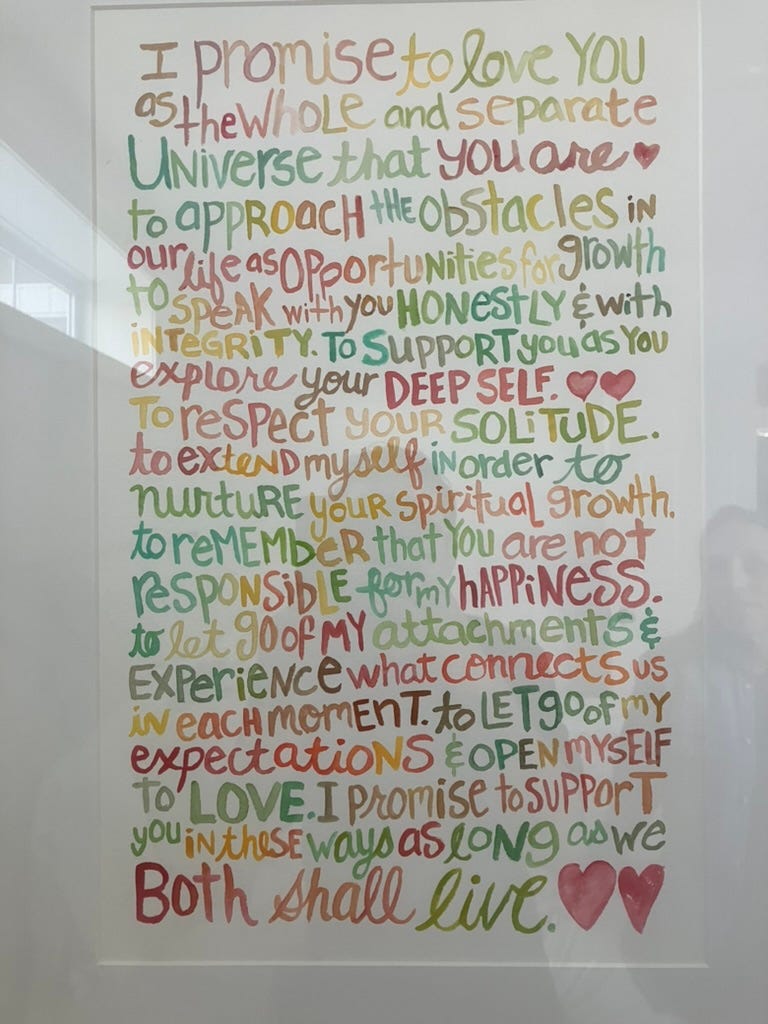As you know, I think a lot about my mentor Terces Engelhart’s question:
“What’s the experience you’re committed to having?”
Earlier this year, I did an overnight visit with my friends Sarah Selecky and Ryan Henderson in Picton, a little Canadian town on Lake Ontario. It was a wonderful visit and I told them about an idea I’ve had for a new podcast called:
I believe that we’ve lost something in our achievement-oriented and consumeristic culture; it’s unsatisfying, yet exhausting, to live a life trying to fulfill our own individual desires. In The Three Vows podcast, I would interview spiritual leaders and everyday people who are intentionally living by their highest commitments and how their lives have been transformed by that. I wanted to ask if “living by vow” would lead to a more fulfilling life.
As a framework, I would take the traditional three monastic vows: poverty, obedience, and chastity, and translate them into modern ones.
The vow of poverty becomes the vow of voluntary simplicity
The vow of obedience becomes the vow of integrity
The vow of chastity becomes the vow of devotion.
As I told them about the podcast, they showed me their wedding vows, posted next to their bed:
Sarah and Ryan, who run the Sarah Selecky Writing School,1 told me that they use their wedding vows as a daily anchor for making decisions together and for how they treat each other. It was remarkable to me because most people don’t remember their wedding vows and certainly don’t live their lives by them. In other words, they were living by a vow of devotion.2 So I asked them if I could interview them as a test of The Three Vows Podcast. I will make this post brief because the real content is in the interview and I’d love for you to take a listen. There is a lot of good stuff in it.
They talk about how the writing of their wedding vows created intentionality for their lives and how living these intentions daily have transformed them. Their vows are a perfect example of how our commitments grow to define us.
They talk about how they treat each other by vow has become how they treat everyone. As the mystics say, “how you do one thing is how you do everything.”
They talk about how the vows require a daily engagement to grow and love. As all vows should do. As my teacher Sister Mary Jo says, “My vows are not about perfection, they are about how I intend to live.” I think a lot about the FF1 3 lesson about internal locus of control here.
Again: I really want you to take a listen:
Let me know what you think! I recorded a couple other interviews but I didn’t know if the idea was interesting to others and I lost steam for recording more.
Do The Three Vows make sense to you? Is finding your highest commitments appeal to you?
Would you want to hear more interviews? Do you know people (famous, not famous) who are intentionally living by their highest commitments that I could interview?
This podcast is an experiment so I'd love your feedback!
If you are interested in writing, you really should check out the Sarah Selecky Writing School. Listen to the podcast and you’ll get a sense of Sarah’s depth and care for her craft and her life.
Traditionally the wedding vow IS a vow of chastity, aka a vow of devotion.
Another FF1 cohort coming in October. Consider signing up!






Yes Douglas! All for a podcast from you!
Any insight we can gain from people of all walks of life on how to find Peace, rest, and enoughness in an anxious world is a blessing!
What a beautiful idea! Yes, I would listen to more. 🙏🏽